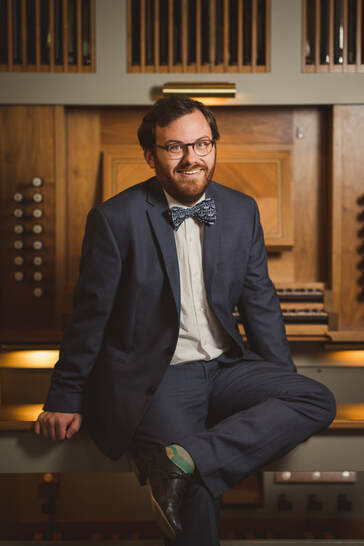by Daniel Hathaway
First, two events that are not happening: a pair of CIM Opera Theater presentations of Nico Muhly’s Dark Sisters on Saturday and Sunday afternoon at the Art Museum have been canceled.
On Saturday: ChamberFest Cleveland presents an InterACTIVE Music Series at East Cleveland Public Library from 1:00 to 3:30 pm, and Music at Main hosts jazz pianist Theron Brown at the downtown library. Concerts tonight at 7:30 include Cleveland Pops Orchestra in Music of Motown at Severance Music Center, and cellist Ian Maksin brings his Cello for Peace Tour to the Maltz PAC.
On Sunday: Arts at Holy Trinity Lutheran in Akron presents the University of Akron Jazz Ensemble, the Church of the Western Reserve presents a recital by organist Mario Buchanan (pictured), both at 4 pm, and Oberlin’s Technology in Music and Related Arts department shares creative work by students in its Berlin Winter Term Project in Stull Recital Hall.
For details of upcoming events, visit our Concert Listings.
ANNOUNCEMENTS:
The Cliburn Competition has named the 77 pianists who have been invited for screening auditions as the Forth Worth, Texas contest begins a new cycle. Read the story on The Violin Channel.
WEEKEND ALMANAC
February 1 — by Jarrett Hoffman:
This date in history was an important one for Giacomo Puccini. The first of February brought the premieres of Manon Lescaut in 1893 and La bohème in 1896, the latter led by a young Arturo Toscanini, with both debuts taking place at the Teatro Regio in Turin.
Bohéme is one of the most frequently performed operas, but it’s interesting to note that at its premiere, critics were divided, and the audience was said to lack enthusiasm. Imagine if that had been the end of it.
Another fun fact about La bohème: Toscanini conducted it again 50 years after the premiere, this time with the NBC Symphony, and the recording made from that occasion is the only one of a Puccini opera led by its original conductor. Listen to the aria “Che gelida manina” from that broadcast, featuring tenor Jan Peerce, cued up here.
February 2 — by Daniel Hathaway:
On this date in 1594, Italian polyphonic master Giovanni Pierluigi Palestrina died in Rome and was buried in St. Peter’s Basilica at the Vatican where he had served in various important positions, most notably as maestro di cappella of the Cappella Giulia. The quality of his counterpoint marked the culmination of Italian Renaissance church music.
Last Friday, the Chicago-based Schola Antiqua presented an all-Palestrina program at St. John’s Cathedral in celebration of the 500th anniversary of his passing.
Cleveland choirs have regularly programmed Palestrina’s masses and motets, including Quire Cleveland (who sing Sicut cervus under guest conductor Jameson Marvin here), and Contrapunctus Cleveland (watch them sing Super flumina Babylonis here, led by David Acres).
Other Palestrina works, not so expressive as those two, can seem a bit cold in their perfection. I personally enjoy some of his later pieces that tend toward the freer Baroque style. Like O magnum mysterium, performed here by The Sixteen with a follow-along score.




